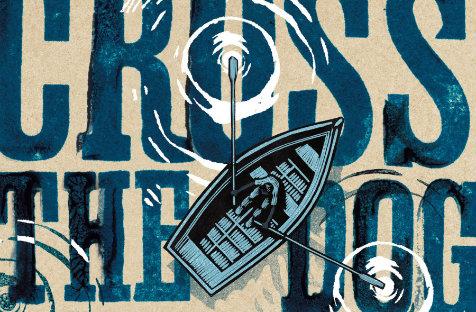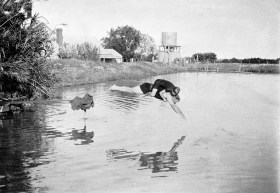Southern Cross the Dog is the debut novel of Bill Cheng, a Queens-born, Brooklyn-based Chinese-American who loves the blues. The ultimate outsider, he has written a tale of morality, compromise and abandon set in the US state of Mississippi in 1927 .
The novel’s title is taken from the name of two railroad lines that used to meet in Moorhead, Mississippi. The junction of the Southern railroad and the Yazoo Delta Railroad (the ‘yellow dog’) was established in 1897 and was popularised in a 1914 song, ‘Yellow Dog Rag’ (later renamed ‘Yellow Dog Blues’), by W.C Handy, a blues musician. The roads have since been renamed.
Robert Chatham, the novel’s eight year old protagonist, lives with his father and his mother and the memory of his brother, Billy.
To begin, Robert is playing with his peers. They chant ‘Sally Clearwater’ and Dora in the middle spins. As the song ends, Dora is pointed towards Robert. They move away from prying eyes. He is shy and tentative and she asks about his brother. The rain begins to fall.
‘The sky had split open,’ writes Cheng. The Great Flood of Mississippi killed 246 people in 1927. At its first turn, Southern Cross the Dog describes an aftermath where the economics of grief and destitution play out.
Cheng builds wild pace into the words as Robert and his family leave their home. From here, Robert’s story is interlaced with that of others – among them, a jealous swindler, a gifted pianist and Miss Lucy, a madam. Her brothel is Robert’s first home after the flood. He grows up an errand boy, a cleaner and general hand. He is displaced more than once, and Cheng’s depiction of those Robert meets on his travels adds both richness and uncertainty to the story. The ploy of many writers is to introduce characters with neat and completed stories. Those here are not so, they are frayed and unfinished; sometimes with reward of an ending, but often not.
That said, Cheng does build on the story of Dora, and hers is perhaps the most compelling of all in this book. The world is unforgiving of Robert Chatham – it beats him and breaks him and through the countryside he runs. He finds solace rarely, is haunted by a black dog, and swears he’s cursed. But the world pays no heed to the smallness of Dora or her vulnerability either.
She is traded by her uncle for a rifle, and finds herself a slave – a maid in the home of a man named Pat Stuckey. She is his captive. By day he leaves and by night, he trades in kindness and cruelty.
In the shadows of Dora’s tale, Robert Chatham’s story seems to descend to an amble, the words and the people and the place falter. The characters drawn for his adult life are not so compelling as the ones that came through his childhood.
The words here tumble and fall across one another. They are vibrant and immersive and quickly catch you up in Mississippi – as if you had been there all along. There is something particularly vivid about America’s Deep South – Southern Cross the Dog exemplifies this. The prologue sets the tone for a novel that is irresistible for its charming depiction of character and place. It is a distinctly Mississippi tone, thickly accented, rich with blues, religion and superstition.
To depict with such clarity the division and intersection of faith, race, place and people – to have written with such conviction the language of others, it is entirely possible Bill Cheng – who, on writing, had never been to Mississippi – could only have been an outsider.
Rating: 4 stars out of 5
Southern Cross the Dog
By Bill Cheng
Paperback, 256pp, RRP $29.99
ISBN 9781447225003
Picador





